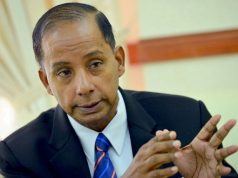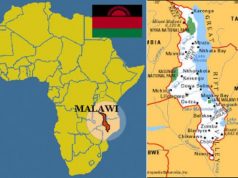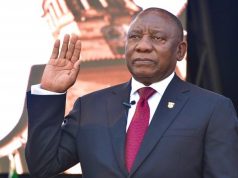WASHINGTON – African finance ministers told their rich nation counterparts at weekend meetings of the International Monetary Fund and World Bank to work harder and faster to kick-start their economies to avoid a prolonged slump that could undermine strong growth in the developing world.
“We are concerned,” Nigerian Finance Minister Ngozi Okonjo-Iweala said at the meetings of global finance leaders.
“If we continue to see slow growth in the euro zone, which provides a large market for many African countries, and is coupled with a slowdown in emerging economies, then we will become more vulnerable,” Okonjo-Iweala told a news conference of African finance ministers. “We need to insist that our partners in other parts of the world work harder and faster.”
Despite a global economic slowdown in 2012, most African economies grew at close to 6 percent buoyed by strong internal demand and higher commodity prices. Strong and better managed economies have also attracted investors’ attention, with net capital flows to the region reaching a record $54.5 billion (35.7 billion pounds) last year, an increase of 3.3 percent from 2011.
African economies are also hobbled by poor infrastructure, high unemployment and growing inequality. The region also remains vulnerable to droughts and floods, and pockets of instability.
Okonjo-Iweala said the region was concerned with how central banks in advanced economies planned to exit from years of easy monetary policy, which has led to a surge in investment capital in emerging and developing countries.
Aggressive stimulus from central banks in the United States, Britain, the euro zone and now Japan has so far failed to spark a reliable recovery, and questions are already being raised over how much more monetary policy can – or should – do.
Okonjo-Iweala emphasized it will be important for central banks to signal early on when they intend to change course.
“The signalling should be given ahead so we can prepare our economies for what the consequences might be, is important because we don’t want to precipitate a situation in which money suddenly flows out of the countries,” she said.
“But also, for us, we should be looking at our own instruments that we can apply should we have problems with volatility that arises out of some portfolio flows that might have come in,” she added.
Cameroon’s finance minister, Alamine Ousmane Mey, said African economies had built up more resilience to withstand economic downturns. Increased trade with the BRICS emerging economies of Brazil, Russia, India, China and South Africa has also helped, he added.
“The BRICS countries which allow us to diversify our trade and rebalance a situation where growth in advanced economies has slowed down,” he said.
LASTING RECOVERY
While Africa has witnessed booms before, many question whether this time Africa’s growth takeoff will stick. New IMF research finds that it is likely to stay on course if countries maintain the strong economic policies of the past 10 years.
Antoinette Sayeh, the IMF’s director for Africa, believes the region has turned a corner.
“We certainly are optimistic that growth will continue to be robust and have an uptick as global growth itself recovers,” Sayeh told Reuters. “We think the conditions that underpin this robust growth in the past are still very much there, that is good macroeconomic management in many countries, good commodity prices, strong investment both domestic and foreign investment in a number of countries.”
Last week, the IMF forecast that Africa will grow at 5.6 percent this year and picking up to 6.1 percent in 2014, with Ivory Coast and Mozambique growing at the fastest clip.
Sayeh said a sustained stagnation in Europe and sharp downturn in investment by large emerging economies posed the biggest risks to the region. “Could it derail growth? Our assessment is that, absent a truly dramatic shock to the global economy, probably not because it is not just externally propelled growth, it is also domestic. That is the difference,” she added.
Sayeh, a former Liberian finance minister, said countries should prioritize spending and those that could afford it should rebuild their fiscal safety nets.
Turning to Kenya, east Africa’s largest economy, Sayeh said the economic outlook was “bright” following a peaceful vote on March 4 that elected Uhuru Kenyatta, 51, as president. Elections five years ago were marred by violence, leaving more than 1,200 dead and hammering the economy.
“Now with a clarified political scene, it is an opportunity to see Kenya’s potential takeoff. That requires a sustained commitment and implementation of reform as we think government intends to pursue,” said Sayeh. “There is a lot of interest on the part of investors in Kenya and sustaining the reforms will be important.”










